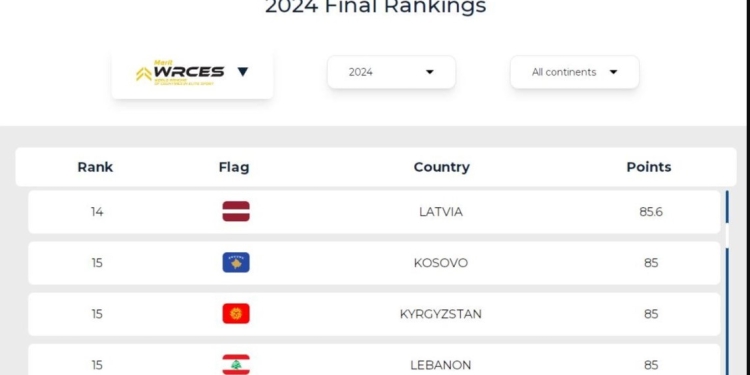Lebanon has achieved the 15th position worldwide and the top rank among Arab nations in the Sports Excellence Classification, which evaluates countries that surpass their national income capabilities and economic potential.
This qualitative ranking recognizes these nations within the annual international sports classification, WRCES, marking an achievement in itself despite the challenging circumstances and the devastating Israeli aggression Lebanon experienced in the last quarter of the previous year.
In this context, Lebanon has progressed to the 93rd position globally and 10th in the Arab world in the overall ranking of the annual WRCES, which includes 206 member countries of the International Olympic Committee and 115 summer and winter sports. The tenth edition, specifically for the year 2024, has been released.
The International Center for Sports Policies and Governance (ICSPG) at Notre Dame University-Louaize (NDU) periodically updates this classification in collaboration with World Sports Rankings.
The steady growth of Lebanese sports is attributed largely to the private sector and the perseverance of federations and clubs, which rely on individual initiatives amid increasing official inaction for various reasons.
Basketball (13%), football (9%), tennis (7.8%), and motorsports (5%) are the leading sports that have boosted Lebanon’s ranking.
The United States maintained its global lead, while France moved up one spot at the expense of England, marking another swap between the two nations. Italy advanced five places to fourth. Japan improved its position by one spot compared to 2024, becoming fifth.
Regionally, Egypt (second in Africa after South Africa) remains at the forefront, but it dropped ten positions globally (from 37th to 47th). Morocco maintained its second place (63rd globally, moving up two spots). Algeria again ranked third, holding its 67th position globally.
For the second consecutive year, Saudi Arabia made significant progress, jumping five global positions to 74th, making it fourth among Arab nations. Tunisia followed in fifth place among Arab countries, dropping six positions globally.
The UAE ranked sixth among Arab nations (80th globally), followed by Bahrain (86th globally), Jordan (91st globally), and Qatar (92nd globally). After Lebanon, Kuwait ranked 98th globally, and Iraq ranked 112th.
The classification was prepared by Dr. Nadim Nacif, a professor in the Department of Physical Education and Sports at Notre Dame University-Louaize, along with his assistants, Andrew Al-Najawi and Maya Gabriel. This requires continuous monitoring and precise calculations, establishing a reliable observatory for tracking the development of sports activities through recorded results in various competitions and their qualification stages, as well as continental and international championships, which reflect on the advancement or decline of countries on this “ladder,” in line with international federations’ rankings based on their competitions and matches.
Seminars on this topic have been held at international scientific sports conferences, shedding light on verification mechanisms, selection criteria, and monitoring.
To expand the monitoring of results and their implications, the general classification has branched out into four additional categories, based on the interaction of sports and its reflections with economic, social, media, and technological impacts, which are:
- Merit Classification – launched to reward countries that excel beyond their capabilities. Jamaica ranked first for the third consecutive year.
- Elite Sports Countries Ranking.
- Global Sports Power Index – which focuses on the impact of sports on the soft power of countries (an instrument for prominence on the international stage).
- Most Fit Countries Index – which provides governments with a precise assessment to implement suitable policies for improving the fitness of their citizens.
The International Federation of Physical Education and Sports (FIEPS) recognizes the results of this index, which includes 142 countries and is acknowledged by UNESCO and the International Olympic Committee.


